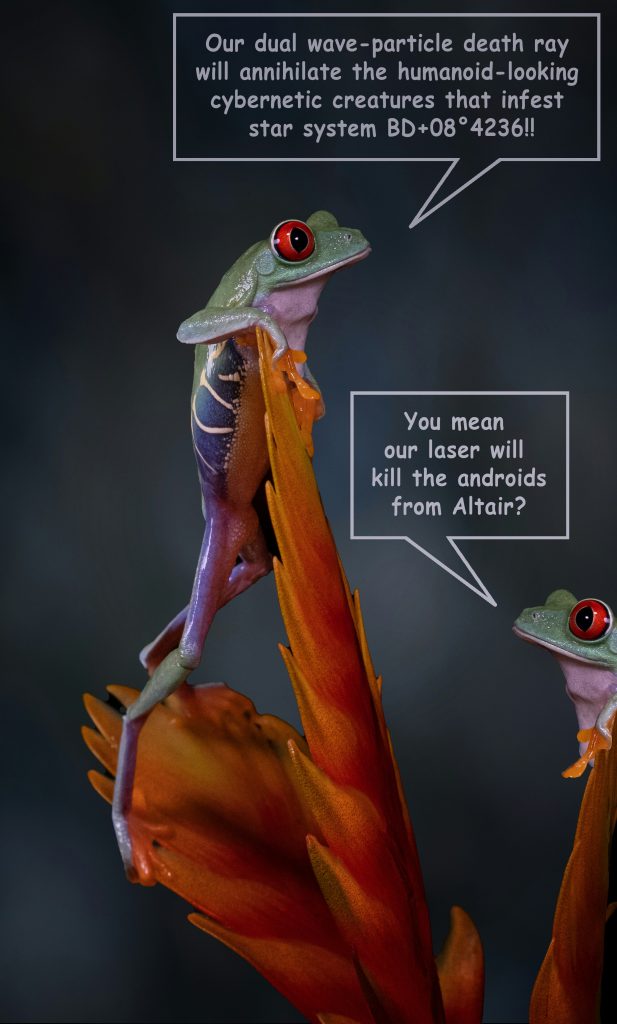 Alexander Lionel, remix of photo by Phil Robson
Alexander Lionel, remix of photo by Phil Robson At a recent writing workshop, I heard a participant comment on another one’s nomenclature: android, laser, Altair were deemed unimaginative clichés. I found myself in instant disagreement. Here’s why.
First, the laser. Real lasers appeared as early as 1960, then were dismissed as beam weapons with the asinine argument that they lacked power. The history of explosives suggests otherwise. What both inventions lack is any theoretical limit, so give it time… (Meanwhile, lasers became essential to surgery and entertainment both!)
Lasers are convenient in storytelling precisely because they exist: just as an author need not explain a fast car or a semi-automatic pistol, so goes a more powerful laser.
On to Altair, one of over three hundred brightest star names inherited from classical Arab culture that A) are known to any moderately well-read citizen, B) roll off the tongue, and C) evoke the awe and mystery of alien places. True, the majority are very bright and distant. However, the stars closest to us, the more common red dwarfs, are all invisible to the naked eye and, with few exceptions, bear names that decidedly trip the tongue: with BD+08°4236, the emotion evoked is the boredom of catalog perusal. (The workshop story’s Altair 4 was a nod to Forbidden Planet, which is beside the point.)
Well-known stars are convenient because they, too, require no explanation whatsoever.
Now to android. This is the dictionary term for a human-looking robot, and its uses go far beyond the bounds of science fiction: several companies are working today to make androids a reality, and while they may lack intelligence, they are certainly humanoid. A staple of SF, androids are often made of flesh-like materials, with the dramatic potential that they can be indistinguishable from human beings.
(Sing along with me, “Androids are convenient in storytelling because…?”) Now to the more relevant question: are androids an unimaginative cliché?
You may well ask the same about other staples of SF stories: are robot, spaceship, and alien clichés? How about time machine and mutant? What they are in fact is common coin, a useful shorthand that is the bread and butter of any specialized field, of which SF is no exception. Specialty terms are used because they are understood by any reader without lengthy and cumbersome explanations.
As new terms appear, others fall into disuse. Lasers can be blamed for the demise of ray gun and death ray. Yet the creators of Star Trek, sensitive to what the recent invention could and could not do, fast abandoned laser in favor of the cleverly near phaser. The creators of Blade Runner called their androids replicants, and one could argue they, too, saw the value of inventing a term they could copyright. Why not always do the same? One reason is economy: if a story requires a neologism be used tens of times, as was needed for Blade Runner, audiences have the opportunity to learn; if it’s used a couple of times, an invented term is a waste when common coin will do.
Legitimate terms drift with time. Before the eponymous Fritz Lang film, the word metropolis had been in use for five centuries, yet it is difficult to see that word nowadays without thinking of the 1927 silent classic. (Megalopolis, first used a century before the Lang film, seems more in line with the size of today’s conurbations.) Likewise apocalypse, originally a specific event—God destroys evil and resuscitates the righteous in the afterlife—and now a synonym for the end of the world by whatever means. Both terms are of course found in SF.
Ursula K. Le Guin needed instantaneous interstellar communication for her Ekumen universe and called it ansible. (I heard she encouraged other authors to use it freely, although I cannot source that she actually did.) You have to admit ansible sounds better than interocitor, the device used in This Island Earth. But it would serve well as common coin and has ten fewer syllables than the description I used above.
Note that Star Wars creator George Lucas did SF a tremendous disservice by calling his robots droids. It is a great, monosyllabic, weird-sounding word, yet while android may conceivably apply to C-3PO, though you’d never confuse shining metal with human skin, the same cannot be said for R2-D2, who is definitely a robot. As a consequence, droid is forever lost (long ago in a galaxy far far away) to SF authors as the short form of android. Fortunately, bot remains available as a synonym for robot. Plus, the popularity of another fictional universe makes SF ideas like warp drive and warp speed readily understood by the general public.
To circle back to the hapless workshop participant taken to task for using laser, android, and Altair: those are respectively real, soon-to-be real, and been real longer than we’ve inhabited this planet as a species. Therefore, I see no wrong in using such to expedite exposition and move the story forward faster, most especially when the concept in question is secondary to the core of the story.

Fabulous essay.